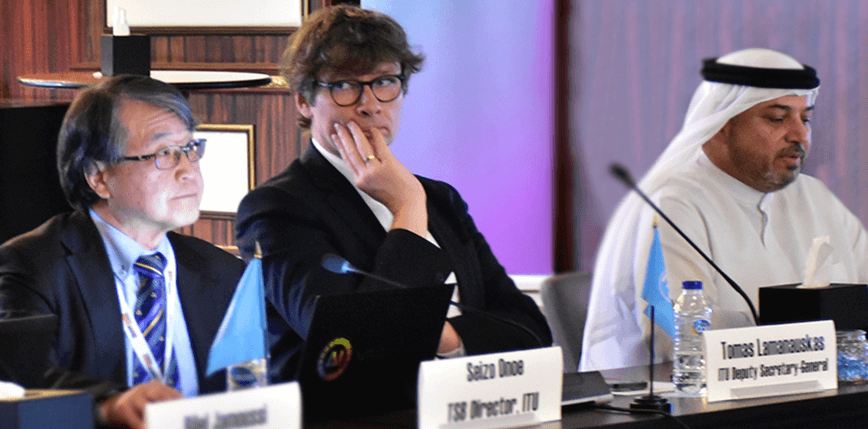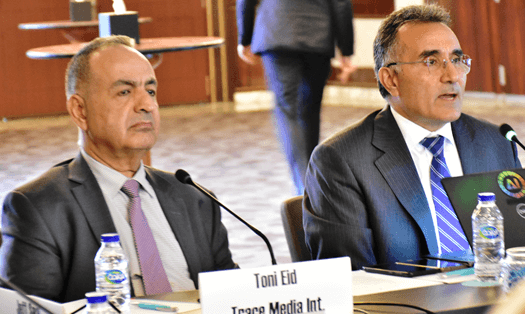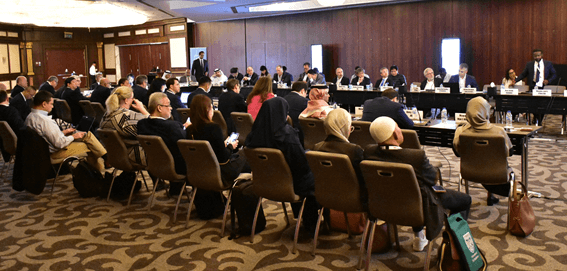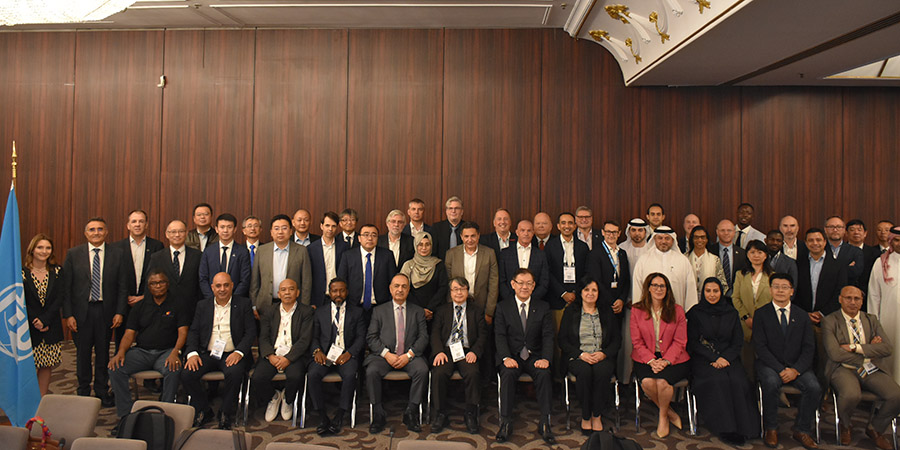Telecom Review, in collaboration with du, TELUS and Huawei hosted the 7th International Telecommunication Union (ITU) CxO rountable on December 5 at the Le Méridien Hotel and Conference Centre, Dubai.
The important ICT standardization meeting saw participation from 34 participating companies: UAE Telecommunications and Digital Government Regulatory Authority (TDRA); AB Handshake Corporation; Afinna One Srl; Bahrain Network; Emirates Integrated Telecommunications Company (du); FNSValue Company Limited; Global Voice Group; Globalmatix AG; Hangzhou Qulian Technology Co., Ltd.; Huawei Technologies Co., Ltd.; Japan Industrial Imaging Association; Jinan Institute of Quantum Technology; Kamaleon; Mukti Mandiri Lestari; Nippon Telegraph and Telephone Corporation; Ooredoo Group; OpenSignal Ltd.; Rohde & Schwarz Middle East & Africa; Sateliot; Senko Advanced Components (Euro) Ltd.; Skylo Technologies Inc.; SomosGov Inc.; State Grid Corporation of China; Technology Innovation Institute; Telecom Review North America; Telefon AB - LM Ericsson; TELUS Communications Inc.; The Telecommunication Technology Committee; Trace Media International FZ-LLC; Transatel; Tunisie Télécom; VIAVI Solutions; World Mobile Group Ltd.; ZTE Corporation.
In his opening remarks, Tomas Lamanauskas, Deputy Secretary-General of the International Telecommunication Union welcomed the participants and recognized Telecom Review’s efforts in hosting the CxO roundtable for the 7th time in a row. He emphasized the need to build robust networks to broaden access to digital technologies that contribute to sustainability, reduce greenhouse gas emissions, and address concerns like e-waste management.

Seizo Onoe, Director, TSB, ITU, Tomas Lamanauskas, Deputy Secretary-General of ITU, and H.E. Eng. Saif Bin Ghelaita, Executive Director, Technology, TDRA, during the CXO roundtable discussions
Seizo Onoe, Director, Telecommunication Standardization Bureau, ITU, underscored three primary objectives crucial to ITU's mission – establishing a community of C-level executives within ITU, fostering information sharing within the community, addressing shared challenges, and charting suitable directions for the industry. Additionally, there was an emphasis on the continuity of this meeting into the next year.
Bilel Jamoussi, Deputy-Director at ITU, provided an overview of the upcoming 'AI for Good' summit on 30-31 May 2024 in Geneva, Switzerland, and World Telecommunication Standardization Assembly (WTSA-24) on 14-24 October 2024 in New Delhi, India during the meeting. He highlighted that ITU's industry focus is coming to fruition through its diverse global and regional initiatives.

Toni Eid, Founder of Telecom Review and CEO of Trace Media International and Bilel Jamoussi, Deputy-Director at ITU during the roundable
H.E. Eng. Saif Bin Ghelaita, Executive Director - Technology, Development Affairs Department, TDRA, stressed that the impact of ICT in sustainability cannot be underestimated. He acknowledged digital transformation as a "formidable ally" across various sectors. He recognized that the technological landscape is constantly changing, and that the UAE has developed a robust ICT infrastructure to keep up with current and future advancements. He also highlighted the need to foster innovation and bridge the digital divide. He noted that ICT was essential for sectors such as healthcare and underscored TDRA’s efforts for sustainable operations. He hoped that the deliberations from the CxO rountable would lead to a brighter future.
Toni Eid, Founder of Telecom Review and CEO of Trace Media International, expressed pride in the company's association with ITU as an Associate. He commended the collaborative efforts of co-hosts, including du, Telus, Huawei, TDRA, and ITU. He regarded Telecom Review as the largest media platform pushing the ICT development agenda.
Hasan AlShemeili, VP and Head of Infra Technology Planning, du, said that it was an honor to be “among visionaries” and hailed technology and collaboration as important tools in an interconnected world.

Participating company members during the ITU CXO Roundable
Brief presentations of the participating companies were as follows:
Nippon Telegraph and Telephone Corporation (NTT)
NTT proposed collaboration between ITU-T and the industry regarding IOWN— designed to contribute to the sustainable use of energy, the creation of new services, and the advancement of industries.
Ericsson
Ericsson presented the Future Mobile Networks' requirements on Optical Networks, recommending that ITU-T comprehends the transport needs arising from IMT-2030. This includes considerations for optical and pluggable technologies, emphasizing the importance of securing inputs from centers of competence in line with the required timeline:
- Continue to produce the recommendations for optical and packet transport in support of IMT-2030.
- Collaborate with and align ITU-T work programs with industry-recognized centers of competence. Examples include: MOPA in the mobile optics area; IEEE 802 for Ethernet; IETF for MPLS, Segment Routing, IP and related; and IOWN GF for all-photonic networks, were cited as examples.
ZTE
Observing the anticipated surge in data traffic in 6G usage and acknowledging the limitations posed by communication technologies nearing the Shannon limit, ZTE has proposed the adoption of semantic communication. In semantic communication, the focus is on the meaning of transmitted messages rather than merely accurate bitstream transmission. ZTE pointed out that with a well-trained semantic base, the requirement for communication resources can be reduced significantly. Academic progress on semantic communication and industry experimental verification in V2Z scenarios was also discussed.
du
du presented the AI 6G framework for MENA. Key discussion points included:
- UAE 6G Vision and Strategy
- UAE AI Strategy 2031
- 6G Standardization Roadmap and Developments
- 6G Use Cases in the UAE
A review of the du ITU CxO 2022 call for action and way forward was also discussed. A proposal and a call to action for the year 2023 were put forth to establish an AI Focus Group (FG) dedicated to 6G development.
Skylo
Skylo put forward the need for Non-Terrestrial Networks (NTN) in enhancing connectivity across space and ocean and highlighted its effectiveness in public safety, inclusivity, scale and reach, digital infrastructure. The proposal for a dedicated ITU Working Group that addresses the convergence of new D2D/NTN technologies, regulatory frameworks, and global standards was deliberated.
Huawei
In presenting the current status of the C-V2X industry in China, Huawei advocated for intelligent vehicle-to-vehicle communication. The proposal included an architecture for a Vehicle-Infrastructure-Cloud integrated system. Huawei urged ITU to enhance collaboration with pertinent standards organizations to foster industry incubation and facilitate deployment, ultimately advancing the smart and connected vehicles industry.
Sateliot:
Sateliot suggested expanding the coverage of mobile network operators to facilitate massive IoT roaming in LEO and NB-IoT. Full support was sought from ITU-T to consider the 3GPP IoT NTN component in SG20 for massive IoT deployments, encompassing both terrestrial and satellite domains. Additionally, support was urged in SG13 for fixed, mobile, and satellite convergence in IMT-2020 networks and beyond, with an appeal for the inclusion of new players in the ecosystem.
State Grid Corporation of China (SGCC)
SGCC sought for innovation in power communication technology and the construction of standard systems as a prerequisite for the secure and stable operation of the power grid. A proposal of standard systems in the application layer, network layer and device layer was put forth to place greater emphasis on greener and sustainable power communication.
TELUS
TELUS proposed a global network for responding to natural disasters – a standardized network approach and architecture that works for all nations (developed and emerging countries) enabling cross-border interoperability during natural disaster crises. It also recognized climate change as a global problem that needed global collaboration by leveling out the reach, redundancy and application needs for all first responders.
Japan Industrial Imaging Association (JIIA)
JIIA pushed the agenda of Machine Vision technology recognizing its wider use in sensing, telecommunication, computing and memory technology development. Through the interaction of the knowledge of ITU and G3 authorities, JIIA foresees obtaining solid reliable standards featuring
ultra-high quality communication, effective ultra-low latency and zero data waste.
Hyperchain
Blockchain technology serves as the technological cornerstone of the digital era, driving digital transformation. Hyperchain emphasized challenges in data element circulation, highlighted opportunities presented by blockchain technology, and proposed the development of standards for blockchain and the web3.0 ecosystem. This proposal advocates for global standards, emphasizing collaboration and consensus-building.
Tablet Comunitário
With the goal of bridging the digital divide, Tablet Comunitário underscored the necessity for comprehensive accessibility to digital technologies in challenging environments. This is to be achieved through the implementation of digital public infrastructure on wheels and digital public infrastructure on fixed platforms, particularly targeting unconnected regions. It proposed universal design and recommendations to member states based on SDG 16 to promote inclusivity in low-resource countries.
AB Handshake
AB Handshake highlighted fraud in telecom and recognized it as a threat for voice communication channels. The organization emphasized that national regulators, while compelled to react, often respond in a dis-coordinated manner, calling for urgent international regulation. In response, AB Handshake proposed the standardization of real-time fraud tracking, the establishment of protocols for staging attacks from abroad, and the implementation of AI-based solutions to address these challenges.
Global Voice Group (GVG)
GVG proposed the implementation of Biometric SIM registration as a crucial measure for governments to mitigate risks in the digital economy and promote development. The urgency of this implementation was justified by reasons such as curbing criminal activities and ensuring compliance with regulatory standards.
Jinan Institute of Quantum Technology (JIQT)
JIQT urged increased international communication and cooperation in the development of Quantum Technology. Emphasizing the promising future of combining Quantum Key Distribution (QKD) and Post-Quantum Cryptography (PQC) in the quantum internet era, the organization called for global collaboration in standardization through entities like ETSI, ITU, etc., as well as in industrialization, infrastructure, and applications.
The final ITU communique can be read here
Also read: Telecom Review Group CEO Toni Eid Honored by ITU at the CXO Roundable
Also read: Telecom Review Successfully Hosts High-level ITU CXO Roundable for 2022
